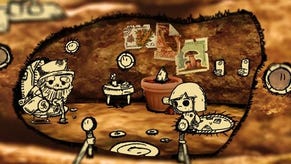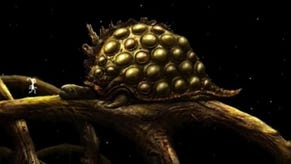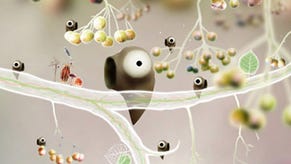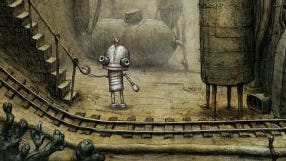Impressions: Alchemia
Clearly the path cleared by Amanita Design, and their wonderful organic point and clickers (Samorost, Machinarium), is one down which others should walk. A team that has followed extremely closely is Springtail Studio, a two-man indie studio who have created Alchemia. To say it's similar to Samarost would be something of an understatement. And of course in the inevitable direct comparison, it falls short. But it remains a charming, if slightly wayward, little adventure.
So I'm going to say "like Samorost" an awful lot now.
Like Samarost, the game is made in Flash, and plays embedded in the website, or independently if you pay for the extended version. Like Samorost, you control a small man, who interacts with his environment by exploratory clicking, solving small puzzles, aiming to advance through each screen as part of a larger, esoteric narrative. Like Samorost this involves engaging with the environment, or discovering the correct order in which to manipulate levers and switches. And like Samorost, the environments are a combination of photographs and cute cartoon creations.
The story here is about a man, Noses, who inadvertently destroys a strange flying machine called Lootpecker. The soul of the machine becomes his companion as he searches the factory where the creature was made to find him a new shell. Then the extended version adds five more levels, and nine more locations, as Noses attempts to create a new soul for a new machine that will help him put out a fire. This is all played out in caves and tunnels created from gorgeous nature photography and detailed Flash animations, mostly by operating machinery or tackling reasonably simple logic puzzles.
What's interesting is learning quite how good Amanita is when experiencing what happens when another team tries the same. It's possibly as beautiful, and while I prefer the aesthetics of Samorost that's only a matter of personal taste, and the music, by Julian Winter, is absolutely wonderful. I've left one of the tunes looping in the background as I write this, and it's yet to feel repetitive. But its shortcomings appear in how these lovely parts all fit together.
The puzzles, while relatively simple once you've figured out what to do - or more frequently how to do it - are often poorly flagged. Requiring you to find the minuscule detail in the muddled background is frustrating, not challenging. And perhaps more significantly, the game keeps forgetting to tell you why you're solving a puzzle. Unable to move on without completing a screen (like Samorost, of course), you solve things because they're there, not because you understand how you're going to progress. Often it's not until you see the next screen that you understand why you were doing x or y, and you feel completely at the mercy of the mechanics, rather than the story.
The story itself is confusing. Characters come and go, scenes appear then disappear, and little is explained. This isn't necessarily a bad thing - just experiencing can be great. But with the muddling puzzles on top, it's hard to hold it altogether in any coherent form in your head. That said, there's some lovely moments, and even touching scenes. A lot of love's gone in, but it doesn't always successfully come back out.
You can play at least half of the game for free on the Springtail site, so you'll know full well if you want to support the developers by handing over the $7 for the rest. And rather magnificently, the soundtrack is available to download for free from here too. But it sure is like Samorost.









